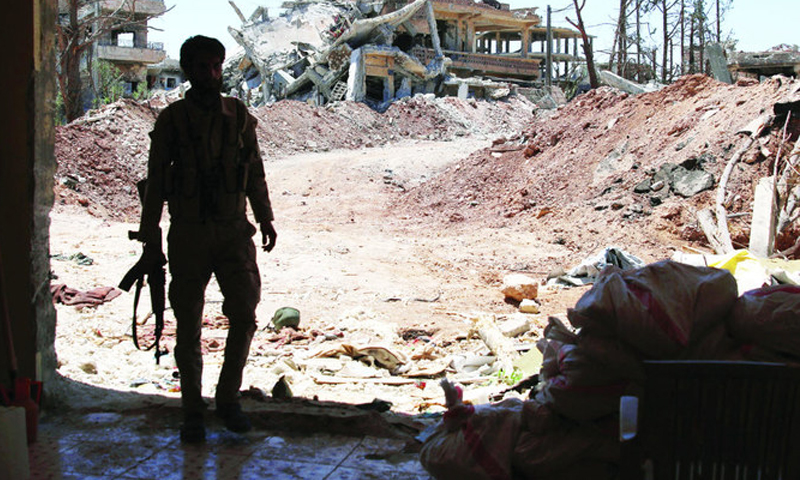



Enab Baladi – Halim Muhammad
“If people knew what the current situation would turn out to be in their governorate of Daraa, the majority of them would have gotten on the now-infamous green buses after the Syrian regime retook control of Daraa,” with these words, Muhammad al-Hajj expressed his opinion, referring to the deteriorating security and economic conditions in his governorate.
The number of young people leaving Daraa has increased during the past months, as there is not a day that goes by that scores of people do not undertake a perilous journey, risking their lives (security risks: an arrest, injury, or even death) to leave Daraa.
To the north, towards Turkey or to the west, towards Lebanon, young people set their sights on Europe to start a new life after they lost hope the living conditions could be improved in the governorate subject to the so-called settlement agreement since July 2018.
Besides, young people are trying to escape Daraa for fear of forced military conscription and the current security conditions, which were exacerbated after “the Syrian regime’s constrictive security measures, the Russian side’s deception and failure to fulfill its promises to rein in its ally,” the researcher Muti` al-Bateen, who comes from the Daraa governorate.
In his speech to Enab Baladi, al-Bateen said that the targeted assassinations by unknown persons and arbitrary arrests left young people with a state of “panic and fear,” mostly since the assassinations were multilateral and the assassins were unknown.
Daraa governorate is experiencing periodic assassinations, often attributed to unknown persons, except for what the so-called Islamic State cells claim through their official web platforms.
Al-Bateen added that “the extreme poverty, unemployment, high prices, and the loss of basic resources such as bread and fuel, which have brought young people to despair from staying in southern Syria, and pushing them to search for better security, social and economic reality.”
Under-Secretary-General for Humanitarian Affairs and Emergency Relief Coordinator Mark Lowcock, briefed to the Security Council on 16 September on the humanitarian situation in Syria, saying that food prices in Syria are still at the highest rates recorded since 2011, even though the value of the Syrian pound remained stable relatively during last August.
He highlighted the impact of the novel coronavirus (COVID-19) on businesses; with 45 percent temporarily shut down, and 15 percent permanently closed and although the number of recorded COVID-19 cases did not exceed four thousand, according to government data, it does not reflect the actual spread of the disease.
There are security problems, such as assassinations, kidnappings, and the increase in the activities of the “Islamic State” and the explosion of remnants of war from the dangers that add to the burdens of the Syrian people.
Migration occurs through an intermediary between the person who wants to leave Daraa and the Syrian regime’s officers to secure passage at the military checkpoints. A young man agrees with the smuggler, described by the political researcher al-Bateen as a “human trafficker,” on an amount of money that increases and decreases according to the guarantees provided by the smuggler to secure access to the desired place.
Ahmed, aged 30 years, thought of migrating to northern Syrian, but he changed his mind for two reasons. First of all, he is afraid that he might be arrested at the checkpoints conducted by the Syrian regime, which happened to many young people who failed to leave Daraa. Second, he does not have three thousand US dollars to give them to the smuggler.
Many young men wanting to leave the governorate sold their property to secure the money needed for smuggling, and “Um Walid” (50 years old) told Enab Baladi that she sold her jewelry and two cows until she was able to get her son out of Daraa.
In addition to the economic challenges faced by those wishing to leave the areas controlled by the Syrian regime, some also fell victim to a field of mines. In mid-August, a number of young people were killed in an ambush near the northwest regions of Syria.
Among the dead was the former leader of the “Free Syrian Army” Ramzi Abu Zaid, who was trying to leave Daraa, as did many other leaders, such as Jihad al-Musalama, who was overseeing the “settlements” file in Daraa, Muflih Kanani, “Abu Hamza Tarbash”, and “Abu Abdullah al-Bardan.”
The former assistant minister of local administration in “the Syrian Interim Government (SIG),” Farouk Abu Halawa, left from Daraa to northern Syria months after the “settlement” agreement signed with the Syrian regime under Russian auspices, in 2018.
According to a previous interview with Enab Baladi, Abu Halawa said that the security grip on those who joined the “settlement” agreement in Daraa ranged between security prosecutions and the initiation of personal lawsuits, or dismissal from their jobs, or seizing their properties by the “terrorism” court of the Syrian regime, which prompted many of them to think about migration.
Researcher al-Bateen believes that the displacement policy is a goal that Iran and “Hezbollah” are working on, to empty the south of the resistance to their project in the region, and to keep only those collaborators who joined the regime’s military and security formations.
In the past two years, the people of Daraa held demonstrations because of the Syria regime and the Russian guarantor’s reluctance to implement the terms of the so-called settlement agreement, which pledged to reform service conditions and ease security restrictions. The demonstrators also demanded Iran’s exist of their city and chanted against the Syrian regime, invoking revolutionary slogans.
if you think the article contain wrong information or you have additional details Send Correction